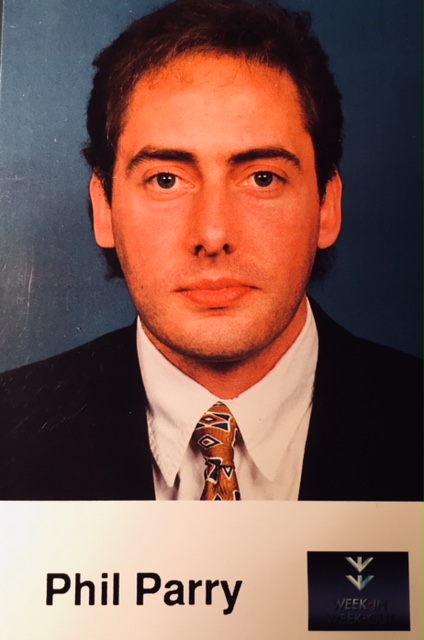- Not acting the part - 24th February 2026
- Death wish - 23rd February 2026
- Return to sender - 20th February 2026

After 23 years with BBC Cymru Wales (BBC CW), and 38 years in journalism (when he was trained to use clear and simple language, avoiding jargon), here our Editor Phil Parry looks at how the pandemic, and the brutal crackdowns on reporters in other parts of the world, have underlined the importance of full media freedom.
Earlier he described how he was assisted in breaking into the South Wales Echo office car when he was a cub reporter, recalled his early career as a journalist, the importance of experience in the job, and making clear that the‘calls’ to emergency services as well as court cases are central to any media operation.

He has also explored how poorly paid most journalism is when trainee reporters had to live in squalid flats, the vital role of expenses, and about one of his most important stories on the now-scrapped 53 year-old BBC Wales TV Current Affairs series, Week In Week Out (WIWO), which won an award even after it was axed, long after his career really took off.
Phil has explained too how crucial it is actually to speak to people, the virtue of speed as well as accuracy, why knowledge of ‘history’ is vital, how certain material was removed from TV Current Affairs programmes when secret cameras had to be used, and some of those he has interviewed.

He has disclosed as well why investigative journalism is needed now more than ever although others have different opinions, how the current coronavirus (Covid-19) lockdown is playing havoc with media schedules, and the importance of the hugely lower average age of some political leaders compared with when he started reporting.
It is plain that controversies today emphasise the vital importance of journalists operating in a free and open environment.
Now we hear that a number of rebel Conservative MPs are alleging they have been intimidated by UK Government figures on behalf of the Prime Minister, Boris Johnson. A lot of these details were initially, of course, given to journalists. It has emerged that police will meet with one of those MPs. He says he was subject to “intimidation” which amounted to “blackmail” against Tories who have questioned Mr Johnson’s position.
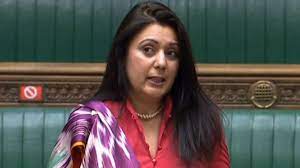
A Muslim Conservative MP has accused a party whip of telling her she was fired from her ministerial job because of her faith. Nusrat Ghani, was sacked as a transport minister in a mini reshuffle early in 2020, but claims there were hidden motives behind what happened.
Another Tory MP, Christian Wakeford who represents Bury South, crossed the floor to join Labour, although it is now clear he had been in negotiations with them FOR MONTHS!
The UK Government spokeswoman Allegra Stratton, was forced to offer a tearful resignation, and an investigation was launched into whether COVID rules were broken, after she was filmed ‘joking’ about a ‘party’.
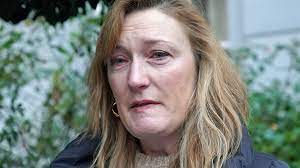
The footage of her ‘joshing’ was given to journalists, and shown on ITV News.
This follows a further recent case when a BYOB (‘Bring Your Own Booze’) party was revealed, and other get-togethers (that have been described as “industrial scale”), which severely damaged Mr Johnson.

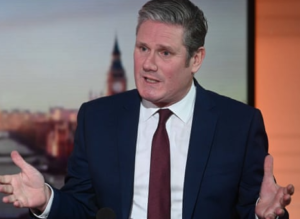
The leader of the opposition Labour Party, Keir Starmer said on the BBC Sunday Morning show: “I think (Mr Johnson) broke the law. I think he’s as good as admitted that he broke the law. And, after all, Downing Street has now apologised to the Queen for some of the parties that have gone on.”
In all of these cases, a free media played an important role.
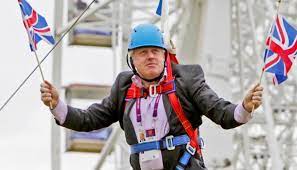
In Wales, the First Minister has been viewed as having a ‘good’ pandemic, with tighter restrictions (and good communication of them) than in England. They were labelled by Mr Johnson as “damaging”, “ludicrous” and “political posturing”.
But Mr Drakeford has not been without criticism in other quarters, too, and disclosures by journalists have been central.

A BBC investigation revealed that guidance issued by the Welsh Government (WG) at the start of the pandemic, declared that COVID patients could be discharged from hospitals and sent into care homes. It also proclaimed that anyone without common COVID symptoms did not need to be tested. This decision “turned safe havens into coronavirus war zones”, according to Care Forum Wales.
We take it for granted that many of these details have been uncovered by journalists working in a society where they are allowed to do their job.
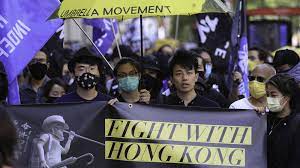
Others around the world, however, do NOT.
People in Hong Kong, for example, have been subjected to a particularly savage suppression of media freedom, and they have protested about it there, as well as in the UK after they moved here under new legislation rushed through Parliament to help them.
Between January and September last year 80,000 Hong Kongers applied to move to the UK using the British National (Overseas) visa system.
10 demonstrations took place in Britain on January 16, calling for media freedom in their home country and allowing it to be taught as in the west. The protest in London attracted an enormous crowd.
![]()

But even in countries where this is allowed, the backdrop is worrying. ‘Celebrity’ ‘journalism’, and low-quality, dumbed-down, ‘reports’ seem to prevail, which are light years away from the work I do (where I work in a free media environment).
Other nations are suffering even more.
For example, after Slovenia seceded from Yugoslavia in 1991, it gave Radio Television of Slovenia (RTV-SLO) a mandate to report independently, unlike the state propaganda that passed for news under communism. But the Government there is now refusing to pay RTV-SLO’s budget, and wants to pass a new media law that will make it easier to control.
In Latvia, the chief risk is the legal and financing structure. The country’s new public-media law fails to include a set-aside tax, like the television licence fee that funds the BBC (which could now be cut after the Martin Bashir affair, or scrapped altogether if the UK Culture Secretary Nadine Dorries is to be believed) and that leaves it vulnerable to political pressure. It is not clear that the new ‘supervisory’ board will be protected from political appointments.
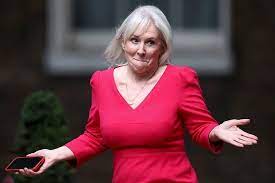
The prime example, of course, is Russia where RT (Russia Today) is accused of being a mouthpiece for Vladimir Putin. By the mid-2000s Russian news shows’ agendas were being set at government-led meetings.
When Viktor Orban won power in Hungary in 2010 he adapted Mr Putin’s blueprint, transforming the state media agency MTVA into a propaganda organ. The group was restructured into a shell company in a fashion that exempts it from the law governing public media, and during the European Parliament elections in 2019, editors at MTVA were recorded instructing reporters to favour Mr Orban’s Fidesz party.
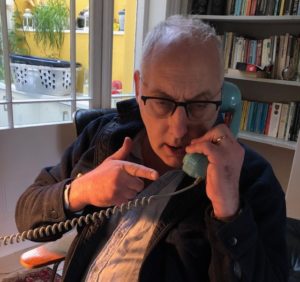
Poland’s Law and Justice (PLS) party followed Mr Orban’s example when it won power in 2015, and quickly turned TVP, the public television network, into a bullhorn for the party. The network championed campaigns against gay rights and demonised the opposition mayor of Gdansk. After he was assassinated by an extremist in 2019, a court told TVP to pay damages, but it has not complied.
The awful abuse I have endured online is as nothing compared with the suffering of others worldwide.
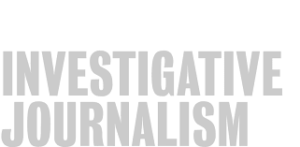
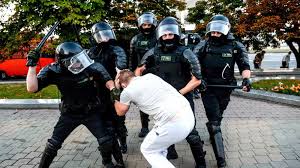
In Belarus for instance the situation is also appalling. At least 16 journalists there are behind bars, and riot police are singling out reporters for arrests and beatings at protests as the media is intimidated.
On May 23 the embattled dictator Alexander Lukashenko, forced a Ryanair passenger plane to make an unscheduled stop in his capital in order to arrest the editor of an internet channel, NEXTA, that has been reporting on his crackdown.
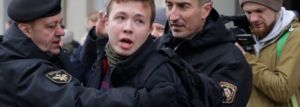
Roman Protasevich, aged 26, was taken off the plane, which was flying from Athens to Vilnius, the Lithuanian capital. Citing what it said was ‘evidence’ that there were explosives on board, the authorities forced the aircraft to land in Minsk as it passed through Belarusian airspace on its way to neighbouring Lithuania, sending a MiG fighter plane to escort the Ryanair jet down. The state news agency later reported that no explosives had been found, and it seems certain that the incident was invented purely as a way of arresting the journalist.

The worrying news came after Marina Zolotova, the editor of Tut.by, an independent news website in the counrry, said: “Blue press jackets and press badges have become targets. When journalists go to cover a protest they cannot be sure that they will come home. This is a real war by the authorities against independent journalism and their own people.” It is clear that Mr Lukashenko is waging a war against journalists who have dared to report on his regime’s brutal crackdown against peaceful protesters.

At least eight protesters have been killed and hundreds more have alleged torture and rape, in police custody.
Among the most high-profile of those in prison is Yekaterina Bakhvalova, who was arrested on November 15 as she filmed riot police firing stun grenades into a crowd demonstrating against the death in police custody of a fellow protesters.
Around the world it appears to be becoming worse for media freedom and investigative journalism – while dumbed-down ‘news’ is seemingly wanted by authorities everywhere.
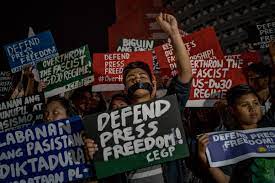 In total the US Press Freedom Tracker, a non-profit project, says it is examining more than 100 “press freedom violations” at protests. About 90 cases involve attacks.
In total the US Press Freedom Tracker, a non-profit project, says it is examining more than 100 “press freedom violations” at protests. About 90 cases involve attacks.
In Russia a special website is devoted to the numbers that have been killed for simply doing their jobs. Sometimes the persecution has official backing. Mr Putin recently signed a law that will allow Russia to declare journalists and bloggers as “foreign agents” in a move that critics say will allow the Kremlin to target government critics.

Under the vaguely worded law, Russians and foreigners who work with the media or distribute their content and receive money from abroad would be declared foreign agents, potentially exposing journalists, their sources, or even those who share material on social networks to foreign agent status.
Even in the (relatively) stable UK there is cause for alarm.

The Chief Reporter for the Mail, the local newspaper at Barrow-in-Furness in Cumbria, Amy Fenton, was forced to flee her home after receiving a torrent of insults and threats when she reported a local court case. Police said there was a ‘credible risk to her life and that of her child’.
In the past I have been called (wrongly), a “bastard”, a “liar”, a “misogynist”, a “little git”, and (accurately), a “troublemaker”, a “nuisance”, “irritating”, as well as “annoying” but this pales into insignificance with what is happening elsewhere around the globe.
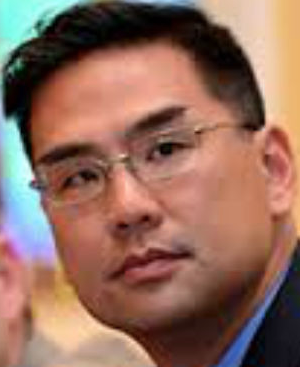
Journalists like me need to have the freedom to make inquiries, and (as has been shown by those brave Hong Kongers) be allowed to DO THEIR JOB!
Tomorrow – how media freedom allows more disturbing details to be reported of a controversial ‘academic’ who was jailed for years after a massive fraud, but hired to work at a headline-grabbing Welsh university where a senior executive was sacked for “gross misconduct”, and a police probe was launched into alleged bribery.
The memories of Phil’s extraordinary decades long award-winning career in journalism (when he could operate in a free environment) as he was gripped by the rare neurological disabling condition Hereditary Spastic Paraplegia (HSP), have been released in a major book ‘A Good Story’. Order it now. The picture doubles as a cut-and-paste poster
 Another book, though, has not been published, because it was to have included names.
Another book, though, has not been published, because it was to have included names.








